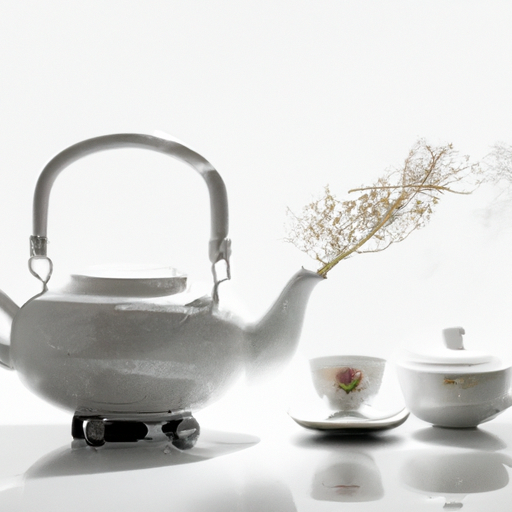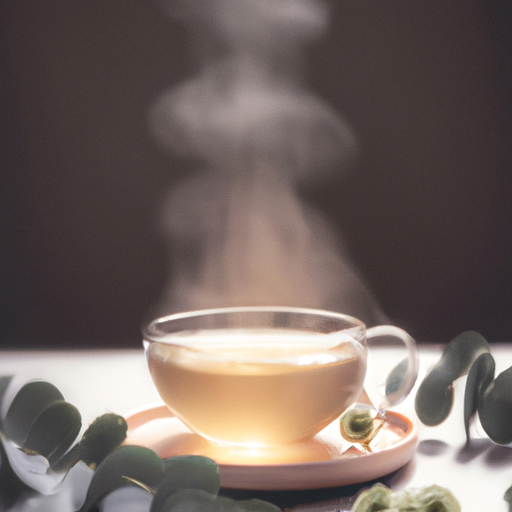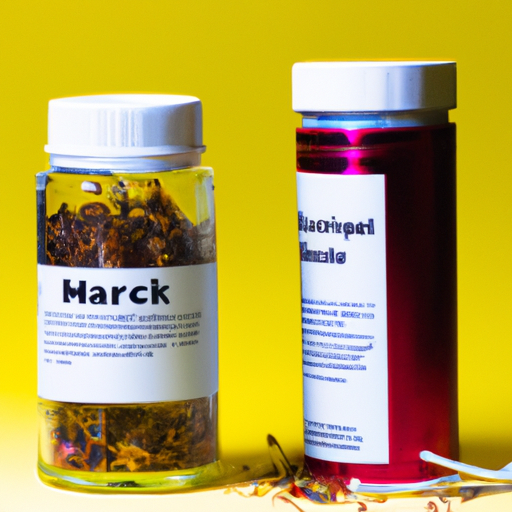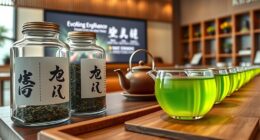Picture your sore throat like a fierce dragon, breathing out scorching flames without pause. Have no fear, as I bring you the remedy of herbal teas. Just like a knight wields different weapons to defeat different foes, different herbal teas possess special abilities to ease and comfort your irritated throat.
These natural remedies have been cherished for centuries, harnessing the healing properties of plants to alleviate discomfort. In this article, we will explore the top contenders in the battle against your dragon-like sore throat, each armed with their own special abilities.
Chamomile tea, with its gentle touch, calms inflammation and promotes relaxation.
Peppermint tea, like a cool breeze, provides a refreshing burst of menthol to ease pain.
Ginger tea, a fiery warrior, fights off infection and clears congestion.
Licorice root tea, a sweet elixir, coats the throat with its soothing and anti-inflammatory properties.
Marshmallow root tea, a velvety potion, forms a protective layer and reduces irritation.
Echinacea tea, a mighty defender, boosts your immune system to ward off further attacks.
Lastly, lemon and honey tea, a comforting embrace, combines the powers of vitamin C and antibacterial honey to speed up recovery.
So, grab your metaphorical armor and let’s dive into the realm of herbal teas, where relief awaits.
Key Takeaways
- Chamomile tea: calms inflammation, promotes relaxation, boosts immune system, has a mild and pleasant flavor.
- Peppermint tea: provides menthol, eases pain, clears nasal passages, rich in antioxidants, boosts immune system, reduces inflammation.
- Ginger tea: fights off infection, clears congestion, has anti-inflammatory properties, boosts immune system, soothes throat irritation, easy to make at home.
- Licorice root tea: coats the throat, has anti-inflammatory and antiviral properties, supports respiratory health, alleviates sore throat symptoms.
Chamomile Tea
If you’re looking for a herbal tea to soothe your sore throat, chamomile tea can be an excellent choice. Chamomile has been used for centuries for its numerous health benefits, and its soothing properties make it particularly effective for relieving the discomfort of a sore throat.
One of the main benefits of chamomile tea is its ability to reduce inflammation. The anti-inflammatory properties of chamomile can help to alleviate the swelling and irritation in your throat, providing relief from the pain and discomfort associated with a sore throat. Additionally, chamomile tea has a mild and pleasant flavor, making it easy to consume even when your throat is sore.
Chamomile tea is also known for its calming effects, which can be beneficial when you’re feeling under the weather. Sipping on a warm cup of chamomile tea can help to relax your body and mind, promoting a sense of well-being and aiding in the healing process.
Next up, let’s explore another herbal tea that can help soothe your sore throat: peppermint tea. With its refreshing flavor and natural cooling properties, peppermint tea can provide relief from the pain and inflammation associated with a sore throat.
Peppermint Tea
To soothe your aching throat, try sipping on some refreshing peppermint tea that’ll make your taste buds dance with joy! Peppermint tea isn’t just delicious but also offers numerous health benefits.
Known for its distinct peppermint flavor, this herbal tea has been used for centuries to relieve a variety of ailments, including sore throat.
Peppermint tea contains menthol, a compound that’s been shown to have soothing properties for the throat. It can help reduce inflammation and alleviate pain, making it an excellent choice for sore throat relief. Additionally, the menthol in peppermint tea acts as a natural decongestant, helping to clear nasal passages and ease breathing difficulties that often accompany a sore throat.
Furthermore, peppermint tea is rich in antioxidants, which can help boost the immune system and fight off infections. This is especially important when dealing with a sore throat, as it’s often caused by a viral or bacterial infection. By strengthening the immune system, peppermint tea can help speed up recovery and prevent future infections.
Peppermint tea is a flavorful and beneficial option for soothing a sore throat. Its unique peppermint flavor combined with its health benefits make it a perfect choice for those seeking relief.
Now, let’s move on to the next herbal tea that can provide comfort for your sore throat: ginger tea.
Ginger Tea
Get ready to experience a comforting and invigorating sensation with a steaming cup of ginger tea that’ll warm your soul and provide relief for your irritated throat. Ginger tea, made from the root of the ginger plant, has been used for centuries in traditional medicine for its numerous health benefits.
Here are four reasons why ginger tea is an excellent choice for soothing a sore throat:
-
Anti-inflammatory properties: Ginger contains compounds called gingerols, which’ve anti-inflammatory effects on the body. These properties can help reduce inflammation and provide relief for a sore throat.
-
Immune-boosting effects: Ginger tea is known to strengthen the immune system, thanks to its high levels of antioxidants. A strong immune system can help fight off infections and speed up the healing process.
-
Soothes throat irritation: The warm and soothing nature of ginger tea can help alleviate throat irritation and provide temporary relief from pain and discomfort.
-
Easy homemade recipes: Ginger tea can be easily prepared at home by steeping fresh ginger slices in hot water. You can also add honey or lemon juice to enhance the taste and add extra soothing properties.
As we move on to the next section about licorice root tea, let’s explore the benefits of this herbal tea for sore throat relief.
Licorice Root Tea
Licorice Root Tea is an excellent herbal remedy for a sore throat as it soothes and coats the throat, providing relief from discomfort. This tea contains compounds with anti-inflammatory and antiviral properties, which can help reduce inflammation and fight off viruses that may be causing the sore throat.
Additionally, Licorice Root Tea supports respiratory health, making it a great choice for anyone experiencing respiratory issues along with a sore throat.
Soothes and coats the throat for relief
Sipping on a warm cup of herbal tea can provide a soothing and comforting sensation, gently easing the irritation in your throat. Licorice Root Tea is one such herbal tea that’s known for its ability to relieve pain and soothe irritation in the throat.
The natural compounds found in licorice root have been used for centuries to treat various ailments, including sore throat. Licorice root contains glycyrrhizin, a compound that has anti-inflammatory properties, helping to reduce swelling and discomfort in the throat. Additionally, licorice root has antiviral properties that can help fight off any underlying infections causing the sore throat.
So, not only does licorice root tea provide relief, but it also has the potential to combat the root cause of your sore throat.
Has anti-inflammatory and antiviral properties
When you’re feeling under the weather, it’s comforting to know that a warm cup of licorice root tea can help ease inflammation and fight off viruses. Licorice root tea is a natural remedy for sore throat that has both anti-inflammatory and antiviral properties. It soothes and coats the throat, providing relief from discomfort.
In addition to licorice root tea, there are other herbal teas that can support respiratory health and alleviate sore throat symptoms. Chamomile tea is known for its calming effects and can help reduce throat inflammation. Ginger tea is another great option as it has anti-inflammatory properties and can provide relief from pain.
Incorporating these herbal teas into your routine can help soothe your sore throat and support your respiratory health. Moving forward, let’s explore how these herbal teas support respiratory health.
Supports respiratory health
As I mentioned earlier, herbal teas with anti-inflammatory and antiviral properties can be beneficial for soothing a sore throat. But did you know that certain herbal teas also support respiratory health?
Incorporating herbs specifically known for their respiratory benefits can provide additional relief. These herbs, such as eucalyptus, peppermint, and thyme, have been used for centuries as natural remedies for sore throat and respiratory issues.
Eucalyptus is known for its soothing effect on the throat, while peppermint offers a cooling sensation and thyme helps to relieve congestion. By incorporating these herbs into your herbal tea, you can not only soothe your sore throat but also promote overall respiratory health.
Now, let’s dive into the specifics of marshmallow root tea, which is known for its soothing properties and can provide further relief for a sore throat.
Marshmallow Root Tea
If you’re looking for a tea that’ll soothe your sore throat like nothing else, try marshmallow root tea. This herbal tea has been used for centuries to support respiratory health and alleviate symptoms of coughs, colds, and sore throats.
Marshmallow root tea offers a range of benefits for your throat and respiratory system. Here are three reasons why it’s worth giving it a try:
-
Marshmallow root has soothing properties that can help relieve irritation and inflammation in your throat. It forms a protective layer that coats your throat, providing instant relief from discomfort.
-
This tea can help loosen and expel mucus from your airways, making it easier to breathe. It can also help relieve congestion and reduce coughing.
-
Marshmallow root tea is packed with antioxidants that support your immune system, helping your body fight off infections and speed up the healing process.
To make marshmallow root tea, simply steep 1-2 teaspoons of dried marshmallow root in a cup of hot water for 10-15 minutes. You can add honey or lemon to enhance the taste and soothing effects.
Now, let’s move on to the next herbal tea that can provide relief for your sore throat: echinacea tea.
Echinacea Tea
Echinacea tea is an excellent herbal remedy for boosting the immune system to fight infections. The active compounds in echinacea have been shown to stimulate the production of white blood cells, which play a crucial role in fighting off pathogens.
Additionally, echinacea tea can reduce inflammation and ease a sore throat, making it a great choice for soothing respiratory discomfort. Finally, this herbal tea supports overall respiratory health by clearing congestion and promoting healthy lung function.
Overall, incorporating echinacea tea into your routine can provide a natural and evidence-based way to enhance your immune system and support respiratory wellness.
Boosts the immune system to fight infections
Chamomile tea, known for its calming properties, can help boost the immune system to fight off infections. Boosting the immune system is crucial when it comes to preventing and treating infections. While there are many natural remedies available, chamomile tea stands out for its potential immune-boosting effects. This herbal tea contains antioxidants and anti-inflammatory compounds that can support the body’s defense mechanisms. Studies have shown that chamomile tea can stimulate the production of immune cells, enhancing the body’s ability to fight off harmful pathogens.
Additionally, chamomile tea has been found to reduce inflammation, which is beneficial for easing a sore throat. By incorporating chamomile tea into your daily routine, you can enhance your immune system’s ability to ward off infections and promote overall well-being.
Reduces inflammation and eases sore throat
When you’re feeling under the weather, a cup of this soothing remedy can work wonders, gently soothing any discomfort you may be experiencing. Herbal teas have long been used as natural remedies for sore throat, and certain varieties are particularly effective in reducing throat inflammation.
Chamomile tea, for example, contains anti-inflammatory compounds that can help ease the pain and swelling associated with a sore throat. Another excellent option is licorice root tea, which not only reduces inflammation but also acts as a natural expectorant, helping to clear mucus from the respiratory tract.
These herbal teas provide relief by targeting the root cause of the sore throat, rather than just masking the symptoms. As a result, they support overall respiratory health, making them a valuable addition to your wellness routine.
Supports overall respiratory health
Nurturing and supporting your respiratory system can lead to improved overall health and well-being. It is essential to take care of our lungs, especially in today’s polluted environment. Herbal teas are a natural remedy for respiratory issues and can provide numerous benefits for our respiratory health. They can help reduce inflammation, soothe irritated airways, and promote healthy lung function.
To give you a deeper understanding, here is a table showcasing three herbal teas known for their respiratory health benefits:
| Herbal Tea | Benefits |
|---|---|
| Peppermint Tea | Relieves congestion |
| Eucalyptus Tea | Clears nasal passages |
| Chamomile Tea | Calms cough and soothes throat |
Incorporating these teas into your daily routine can support your respiratory system and help you breathe easier. Now, let’s explore the benefits of lemon and honey tea for soothing a sore throat.
Lemon and Honey Tea
Lemon and honey tea is a soothing remedy for a sore throat, as it combines the healing properties of both ingredients. Lemon is rich in vitamin C, which boosts the immune system and helps fight off infections. It also has antibacterial properties that can help kill bacteria in the throat that may be causing the soreness.
Honey, on the other hand, has natural antibacterial and anti-inflammatory properties. It can soothe the throat, reduce inflammation, and provide relief from pain.
To make lemon and honey tea, start by boiling water. While the water is boiling, squeeze the juice of half a lemon into a mug. Add a tablespoon of honey to the lemon juice and mix well. Once the water has boiled, pour it into the mug and stir until the honey is dissolved. Let it cool for a few minutes before sipping.
You can drink this tea multiple times a day to soothe your sore throat and enjoy its many benefits.
Lemon and honey tea is a delicious and effective remedy for a sore throat. It combines the healing properties of lemon and honey, providing relief from pain and inflammation. Give it a try next time you’re feeling under the weather!
Frequently Asked Questions
Can I drink herbal tea if I have a sore throat caused by a bacterial infection?
Yes, drinking herbal tea can help soothe a sore throat caused by a bacterial infection. It has antibacterial properties and can provide relief by reducing inflammation and promoting healing in the throat.
Are there any potential side effects or risks associated with drinking herbal tea for a sore throat?
When it comes to drinking herbal tea for a sore throat, it’s important to be aware of potential side effects and risks. While generally safe, some individuals may experience allergic reactions or interactions with medications.
How many cups of herbal tea should I drink per day to help relieve my sore throat?
To help relieve a sore throat, I recommend drinking 2-3 cups of herbal tea per day. Herbal tea made with ingredients like ginger, honey, and lemon can provide soothing benefits and help reduce inflammation.
Can I add other ingredients, such as lemon or honey, to my herbal tea for a sore throat?
Yes, you can add ginger to your herbal tea for a sore throat. It has anti-inflammatory properties and can help soothe the throat. Steep the tea for 5-10 minutes for maximum effectiveness.
Are there any specific precautions or recommendations for pregnant women who want to drink herbal tea for a sore throat?
Pregnant women should take precautions when drinking herbal tea. Are there alternative herbal teas for sore throat during pregnancy? Consult a healthcare provider for safe options, as some herbs may have adverse effects on pregnancy.
Conclusion
After delving into the world of herbal teas for sore throats, it’s clear that there are several options to choose from.
Chamomile tea provides soothing relief, like a gentle embrace for your throat.
Peppermint tea acts as a refreshing balm, like a cool breeze on a hot summer’s day.
Ginger tea warms and comforts, like a cozy blanket on a chilly evening.
Licorice root tea offers a sweet and calming touch, like a warm hug from a loved one.
Marshmallow root tea coats and protects, like a shield against discomfort.
Echinacea tea boosts your immune system, like a warrior ready to fight off any intruders.
Lastly, lemon and honey tea provides a soothing and healing remedy, like a ray of sunshine on a cloudy day.
So, next time your throat feels sore, reach for one of these herbal teas and let nature’s remedies work their magic.










